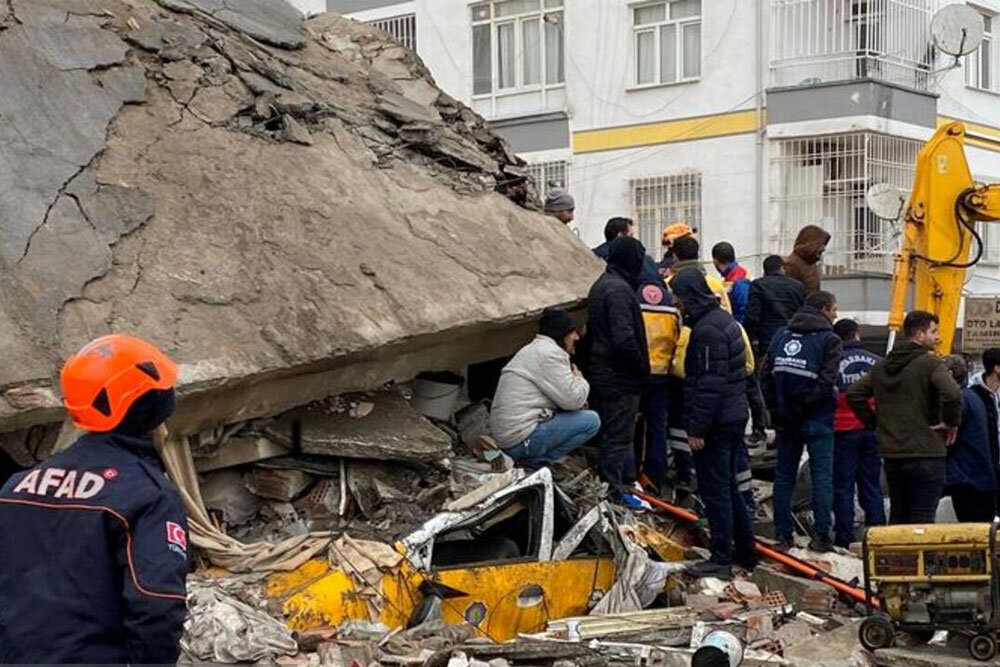The death toll from the devastating earthquake on Monday has reached 4,800 in Turkey and Syria, raising the ominous specter of a humanitarian catastrophe in the region; Rescue and relief efforts are currently in full swing.
After a series of high-intensity earthquakes struck Turkey’s southeastern region bordering Syria in the early hours of Monday, authorities on Tuesday morning confirmed at least 3,381 deaths and more than 14,000 injuries.
In neighboring Syria, where crippling Western sanctions have exacerbated people’s misery, at least 1,444 deaths have been confirmed.
ALSO READ: 7.8-magnitude earthquake kills thousands in Turkey and Syria
Authorities in disaster management in the two nations are concerned that the death toll from Monday’s magnitude 7.8 predawn earthquake, which was followed by a magnitude 7.6 earthquake and a series of aftershocks hours later, will continue to rise as rescue workers attempt to locate survivors among the rubble.
The initial earthquake was located approximately 33 kilometers (20 miles) from Gaziantep, a significant Turkish city and provincial capital, according to the US Geological Survey.
The quake, which was felt as far away as Cyprus and Lebanon, was felt in several cities across the two countries. According to reports, rescuers are working to extract survivors from the rubble of more than 5,600 buildings that were destroyed.
According to reports, officials said on Tuesday that freezing temperatures in the worst-affected areas hampered rescue and search efforts throughout the night.
In his remarks on Monday, Turkish President Recep Tayyip Erdogan referred to the earthquake as the nation’s “largest disaster” since a major quake in the eastern province of Erzincan in 1939.
“Everyone is putting their heart and soul into efforts, even though the winter, the cold, and the earthquake that happened at night make things harder,” he said, noting that 45 nations had offered to support the search and rescue efforts.
Despite the international community’s continued focus on Turkey, there are still a lot of injured people pouring into clinics and hospitals in Syria.
The provinces of Aleppo, Latakia, Hama, and Tartus, according to the Syrian health ministry, have sustained significant damage.
Even as volunteer groups in the area joined forces to carry out rescue and relief efforts, the Syrian government on Monday pleaded with the international community to help the country after the devastating 7.8-magnitude earthquake.
Bassam Sabbagh, the UN representative for Syria, told reporters that he handed a letter requesting assistance from the country’s foreign minister to Antonio Guterres. He added that Guterres “assured us that the UN will do all it’s possible in helping Syria in this very difficult situation.”
On Tuesday, the United Nations reported that at least 325 structures in northwestern Syria had been damaged or destroyed, including aid warehouses in the enclave that is home to millions of displaced people.
Prior to this, Guterres had called on the international community to assist the tens of thousands of affected families and expressed his deep sorrow over the deaths brought about by the powerful earthquakes. Additionally, he mentioned that UN teams are providing assistance on the ground.
Catherine Smallwood, the emergency officer for Europe for the World Health Organization, issued a warning that the death toll could surpass 20,000.
She was quoted by AFP as saying, “There’s continued potential for further collapses to happen, so we do often see in the order of eightfold increases from the initial numbers.”
Unfortunately, “we always see the same thing with earthquakes,” which is that initial reports of the number of people who have died or been injured will significantly rise in the following week.
Medical care in the northwest was “strained beyond capacity, even before this tragedy,” according to the International Rescue Committee (IRC), which has called for increased funding for humanitarian assistance in Syria.
The disaster “will worsen the suffering of Syrians already struggling with a severe humanitarian crisis,” according to Carsten Hansen, the director for the Middle East at the Norwegian Refugee Council. Meanwhile, the Middle East Council of Churches (MECC) called for the immediate lifting of sanctions imposed on Syria, claiming that the sanctions were hindering efforts to provide the Syrian people with basic necessities in order to respond to the devastating earthquake.
It said in a statement on Monday, “We urge the immediate lifting of sanctions on Syria and allowing access to all materials, so sanctions may not become a crime against humanity.”

